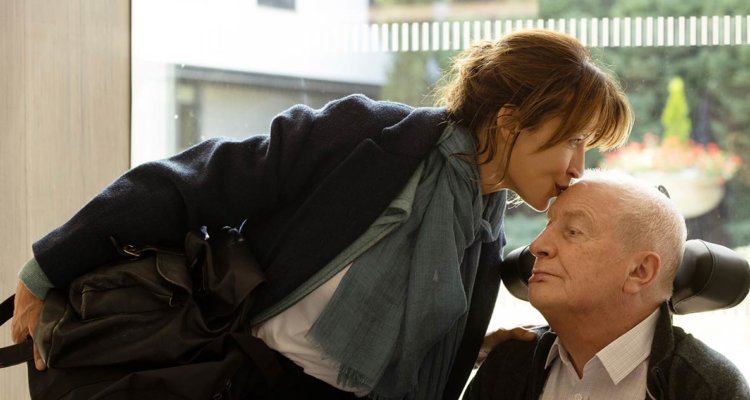You can never really predict what François Ozon might do next. As evidenced by his wide-ranging works, from the lush historical drama “Frantz” to the lazy summer romance “Summer of 85,” the prolific director can do just about anything with the stylistic prowess to boot. His latest, “Everything Went Fine,” comes as another surprise, not because it shocks in any way, but because it’s restrained to the point of lacking any emotion. The film perhaps has more in common with Ozon’s understated Catholic church abuse drama “By the Grace of God,” but this euthanasia tale is entirely drained of the urgency that made its closest relative so compelling.
READ MORE: Cannes Film Festival 2021 Preview: 25 Films To Watch
Adapted from Emmanuèle Bernheim’s account of her father’s death, the film takes a matter-of-fact approach to the much-debated issue of assisted suicide. It doesn’t take long to get started either: André (André Dussoliier) suffers from a stroke that leaves him partially paralyzed, much to the distress of his two daughters Emmanuèle (Sophie Marceau) and Pascale (Géraldine Pailhas). Title cards indicating the passage of time show his long road to recovery, but when he appears to be on the mend, André has other ideas: he enlists Emmanuèle, who has stayed faithfully by his bedside, to help end his life.
READ MORE: Summer 2021 Preview: Over 50 Movies To Watch
Whether out of love or simply just forced by André’s immovable stubbornness, Emmanuèle swiftly sets his plans in motion. It’s difficult to discern the relationship between father and daughter, with Ozon leaving the audience to decipher their murky exchanges. Flashbacks in which André berates Emmanuèle for failing to read a map or simply eating allude to a tense bond, but these hints are few and far between and do little to enlighten us on why she’s so willing to help him now. But seemingly, all is forgiven, as Emmanuèle struggles to let go. A sandwich half-eaten by André stowed away in the fridge operates as a subtle motif for how she holds onto signs that he’s still around, making his mark on the world – but nothing can stop the slow decay. Sophie Marceau is a strong and stoic presence but gracefully shows her cracks behind closed doors. The only opportunities she allows herself to grieve.
READ MORE: The 100 Most Anticipated Films Of 2021
“Everything Went Fine” isn’t concerned with the tired ethical questions around assisted suicide and is more preoccupied with the lengthy and complicated minutiae of organizing one’s death. There are stacks of forms to sign, officials to consult, and then there’s the matter of whittling down the date (“D-Day,” as André jokingly calls it). And though the family’s patriarch might not have any personal reservations, the objections of certain relatives also illustrate the collective shockwaves a choice like this can erupt. Euthanasia is exhausting, not only as an emotional ordeal but as a tangled web of bureaucracy. Ozon’s screenplay offers brief moments of wit and levity, but the film is about as engrossing as a perfunctory check-up at the doctor for much of its runtime.
READ MORE: The 25 Best Films Of 2020 You Didn’t See
Between the tedious meetings, the legal issues, and the travel logistics, there is a measured and potent look at why people choose to be euthanized. In André Dussoliier’s devastating performance, we witness how illness doesn’t just rip those afflicted of one’s autonomy and body, but of their dignity. (At first, André, in a vulnerable and almost child-like state, cowers away from his daughters to prevent them from seeing him debilitated.) Meanwhile, Emmanuèle and Pascale cling to the hope that their father will be assuaged of his steadfast eagerness for death. “Don’t worry, in the end, they usually choose life,” a nurse reassures them at one point, clouding them from the fact that André will pick the other option. You can call life beautiful as much as you want, but the view isn’t always as sweet from another perspective.
For all of its careful observations, it’s still an absolute slog to get through. “There are many colors in gray,” says Claude (Charlotte Rampling), Emmanuèle’s retired sculptor mother whose art is exclusively monochrome. If this suggests that there is beauty in monotony, you could hardly find that reflected in this one-note film. In fact, the story becomes its most engaging when it flirts with the unexpected hurdles, with the final act introducing the rare moment of excitement in a potential run-in with the police. But as with life, death can evidently be just as boring. The film’s title – which is uttered towards the end as a last-minute emotional punch to the gut that arrives too late to leave a real impact – feels particularly apt. “Everything Went Fine” does go down just fine. No more, no less. [C+]
Follow along with our full Cannes 2021 coverage here.

